#it's thematically relevant
Text




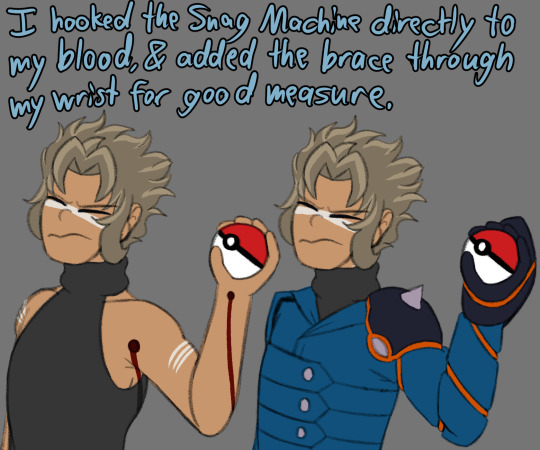

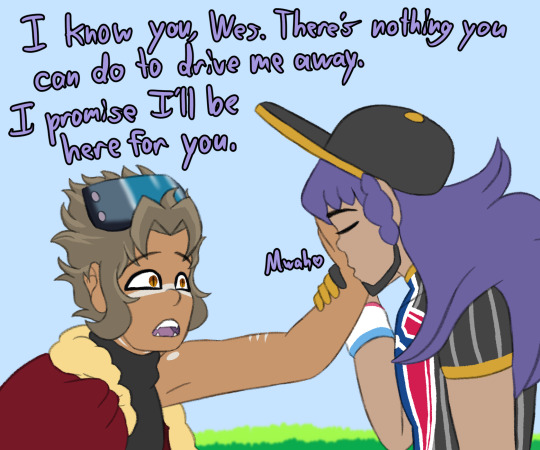
So @texasflowers made an art post explaining how they think the Snag Machine works, so obviously I had to contribute.
Patreon - Etsy
#this was not just an excuse to have leon kiss wes's wrist i prommy#also the blood thing is not just for edginess#it's thematically relevant#“the blood of the covenant is thicker than the water of the womb” “a bleeding heart”#i am standing in front of a conspiracy corkboard#the theme of hurting yourself and everyone around you to escape the oppressive system that's been hurting and exploiting you#but only truly being free once you learn to heal through a support network and one person that truly believes in you#yes i did watch a video essay about the themes of utena. what about it#also tagging other cool people bc thats the only way i know how to make friends#pokemon colosseum#trainer wes#wes pokemon#pokemon sword and shield#champion leon#leon pokemon#desertsportshipping
18 notes
·
View notes
Text
trying to title things is the bravest and most dangerous thing a girl can do
#spent two hours reading about mathematical game theory on wikipedia to try and find something to base a title on#it's Thematically Relevant#and I need my titles to be thematically relevant so bad
3 notes
·
View notes
Text
re-reading the locked tomb, and i'm thinking about how harrow identifies alecto as a "girl" rather than a "woman."
obviously, john had other sources of inspiration... but did you know that the original barbie doll was only supposed to be nineteen years old?
#given that tamsyn says she writes books for angry girls and her seventeen-year-old self: it feels VERY thematically relevant#i’m kicking myself a little for not picking up on it earlier!!!#also: contextualizes john and alecto’s relationship Differently to say the least. sidenote: everyone should read the magician’s apprentice#(the 2013 short story by tamsyn muir)#the locked tomb#tlt#tlt meta#alecto tlt#john gaius
575 notes
·
View notes
Text
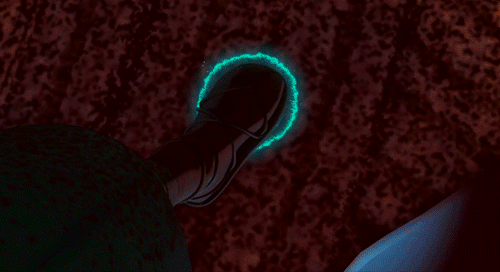



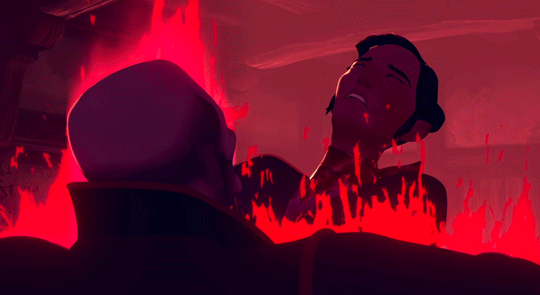
FOR WHOM THE BELL TOLLS
Blue Eye Samurai || 1x06 - All Evil Dreams and Angry Words
#i need more ppl to talk about these scenes#forever obsessed with the whole murder mansion sequence i don’t think u guys understand#raised the bar forever#mizu trIPPIN BALLS on the brink of death slaughtering thousands covered in blood trippy aesthetic#THEMATICALLY RELEVANT NEON BLUE#THEMATICALLY RELEVANT FOR WHOM THE BELL TOLLS SOUNTRACL#THEMATICALLY RELEVANT HELL IMAGERY#ohhhggg this was made for mi#blue eye samurai#movies#(the zombie fight is also cool af but it wasn’t very gif friendly lmfao
1K notes
·
View notes
Text
the power of this scene cannot be captured in gif form. sound ON
#they basically made a 15 minute parody of their own show within their own show. in a way that's narratively and thematically relevant.#& is both misleading AND incredibly revealing at the same time in ways most viewers may not understand until episodes or even seasons later#WHO is doing it like this#interview with the vampire#vampterview#iwtv#s#iwtv spoilers
233 notes
·
View notes
Text
to summarize an unduly rambly post: our control over kris has been steadily growing more and more distressing for them throughout the story. the snowgrave route, possibly the most gut wrenching, violating imposition of our will on theirs AND Noelle's (*homer voice* so far!), explicitly, thematically, and visually represents possession and coercion through romantic imagery, specifically rings and weddings. it's nauseating. it forces both of them into an implied relationship that neither of them is comfortable in by leveraging noelle's desperate wish to reconnect with her childhood friend. it has exactly the horrible connotations you don't want it to have.
ralsei being presented as both a direct callback to asriel—both the undertale asriel we know, and y'know... kris' brother in deltarune—while also setting him and kris up in a clearly romantic context that kris does not seem to either share or be comfortable with, is not a coincidence. it's not an accident. "isn't that a little incestuous" that's the point! kris' agency being stripped away is one of deltarune's main thematic cores: the game is repeatedly setting up a pattern where that theme is reinforced by putting kris in upsetting, unwanted romantic relationships for OUR entertainment. nothing fits the bill better than pairing them with the nostalgia bait companion that literally looks like their brother.
#incest mention#I'm sorry your only experience with incest as a literary topic has been the skeleton brothers lightsaber-fighting with neon colored dicks#but it's almost like delicate & upsetting topics can be used to have thematically relevant and also upsetting narrative functions#yes! on YOUR computer! it's more likely than you think#not all media is meant to be escapism not all media is made to make you feel good#certainly not one that calls the player's actions and presence into question like DR#deltarune#kris#noelle#ralsei#yeah I'm tagging this one it's just straight up good analysis#entry log#metanalysis
393 notes
·
View notes
Text


it's interesting that the word "shining" is used in utena and akio's conversation about childhood, in contrast to utena and anthy's "someday, together, we'll shine" being linked to their promise to have tea together in ten years, when they're both adults. they understand what he doesn't -- that the future can be better and brighter than the past. life doesn't only get worse as time goes on, and neither do people, because growing up is part of growing as a person. it's especially interesting considering that akio is literally just wrong here. stars actually become brighter as they age, not dimmer.
#akio's thematically relevant complete lack of knowledge about astronomy strikes again#to be fair i don't know much about it either but one simple google search tells me the exact opposite of what he's saying#revolutionary girl utena#analysis#utena#akio#anthy#m
218 notes
·
View notes
Text



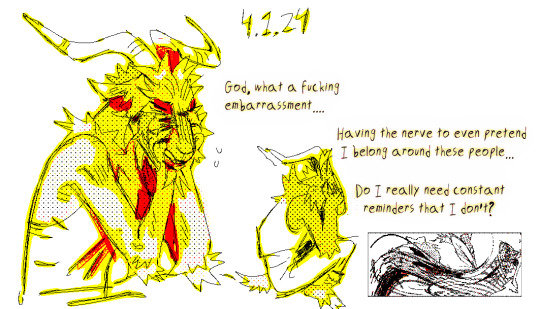
Dailies
#hoof draws#these are all annoyingly pointless but i'm not going to have anything to post in the next few days. so enjouy#👍#and also seems thematically relevant today
182 notes
·
View notes
Text
the doctor who movie has my favourite plot in the entire world.
set in the distant future of 1999. kill off the main character immediately. oh no here's the master. he's turned himself into a silver worm. the brief frankenstein doctor who crossover you weren't expecting. there's this made-up thing they're talking about. and several more made-up things. for luck. they go for a walk and talk about shoes. there's another made up thing. puccini. they're lesbians your honour. the master gets a funky little outfit. a major plot point is contrived to facilitate an absolutely sick ambulance-motorbike car chase. world's going to end. the time machine of the time lords holds a mysterious, powerful and deadly device that can only be opened by a human. no explanation is given. eye of harmony eats the master. unclear how he will survive this. this will also not be explained. the doctor finishes their cup of tea.
#doctor who#eighth doctor#it's my favourite!!#and it's thematically relevant!!#for this time of year!!#doctor who movie#disclaimer i haven't watched all of classic who yet#the eye of harmony might be a well established concept#in which case i apologise for casting aspersions on the doctor who universe's internal logic and continuity
239 notes
·
View notes
Text
I've seen people say that Deku and Shigaraki teaming up to defeat afo allowed Shigaraki to die as a hero, therefore completing Tenko's dream before his end. But in my opinion:
Shigaraki being a hero because he gave social rejects a place of belonging >>>>>> Shigaraki being a hero because he punched afo.
Shigaraki did NOT die in an act that made Tenko's dream of becoming a hero come true. Tenko wanted to reach out his hand for the outcasts, not to punch evildoers.
This doesn't feel like a meaningful "coming full circle" for his character arc, at least not from that angle. Tenko was already living his dream by being a hero for the league!!! <3
#“shigaraki dies defeating afo”-ending my beloathed#except he didn't even do that because wasn't afo crumbling bc deku punching him and the ofa overloading?#so it was like “we are dying either or. so might as well punch this dweeb”#afo's own creation coming to bite him in the ass is kinda cool (classic mastermind-villain fumble) but tomura didn't have to die for that??#tomura living would have pissed off afo more i feel like. him failing to erase shimuras from existence#tomura dying is a win for afo and a confirmation that he successfully ruined a little child beyond salvation#I HATE IT HERE#shigaraki tomura#bnha 423#bnha spoilers#all for one#bnha#also we got tomu overpowering afo in 379 and it was already great. what thematic relevance is there in doing it again?#cause it feels like no additional info was gained. no insight no reflection.#am i even making sense?
133 notes
·
View notes
Text
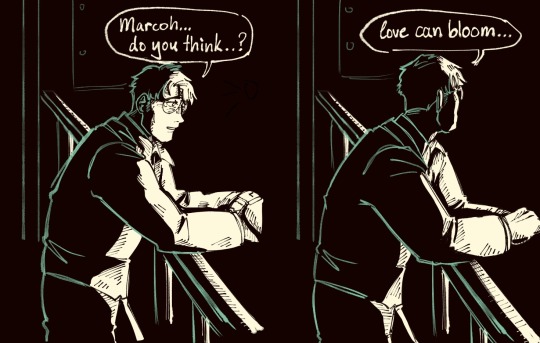

“Yeah. I do.”
#was gonna put this in the last metal gear hunger post but pav took everything outta me and i had to finish later#fear and hunger#fear and hunger termina#kida tanaka#fear and hunger marcoh#marcoh#idk their ship name but they’re cool and thematically relevant which is enough to convince me#my god the themes surrounding these two go so hard#my art
755 notes
·
View notes
Text
am i just blorbo brainpilled to hell or does zote technically haunt the narrative if you leave him to die because of the glaring 'neglect' achievement you earn and how the pale beings did the same things to ghost and the vessels and therefore ghost can never be the same once it consciously decides to do that
#what the fuck. i guess i cant really see them the same after that since it is framed to be quite callous#what other characters haunt the narrative. pk obviously#in a literal sense since his visage is everywhere and you can't even sit on a bench without paying him geo. he also traumatized ghost#who else..... im trying to see it from a thematic point of view. plot wise almost everyone from the past is haunting the story.#including the citizens#i also cant remember anything about this game my brain only likes the two loser bugs who aren't super plot relevant. post CANCELLED
321 notes
·
View notes
Text
Another thing that I really appreciate about SotO is that the initial release sets up the idea of that the commander would save the farm, and then immediately the story puts its money where it’s mouth is.
As SOON as the commander realizes that the Kryptis are as much a victim here as anyone, they’re willing to join the “side” they were fighting against literally less than an hour ago. They’re in Nayos not because they particularly need to be, but because there’s a chance someone needs them.
#idk I just have sooooo many feelings#I SEE THE VISION. I SEE WHAT THEY WERE GOING FOR.#that’s part of the reason I didn’t really mind as much the obvious budget constraints#because the thematic relevance was so good for me personally#gw2#SotO spoilers#SotO enjoyers bookclub
75 notes
·
View notes
Text
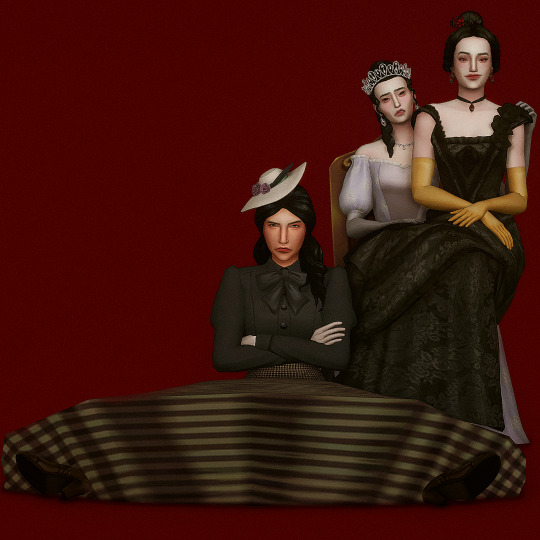
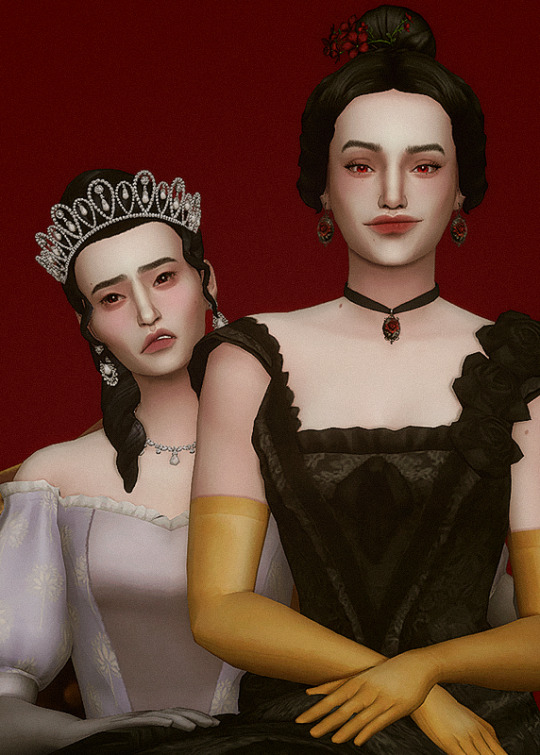
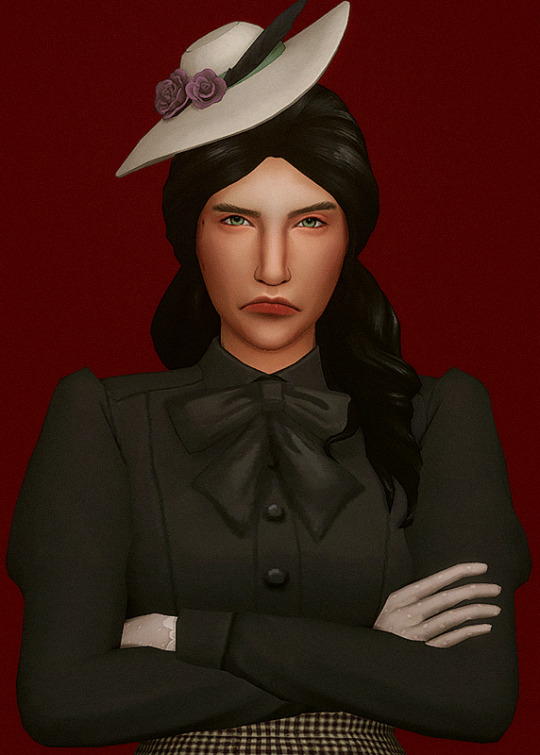
VICTORIAN
Requested by @birdietrait, @kirsicca and @antiquatedplumbobs
Starring Helena Zhao, Lilith Vatore and Ulrike Faust
The Favourite but make it Victorian. These ladies can't stay away from the drama in any decade!
#ts4#sims 4#simblr#the zhaoverse#helena zhao#lilith vatore#ulrike faust#it's probably because i have history blindness but when i pictured these three in the victorian era i immediately thought of this movie#of course i quickly realized it's not victorian but thematically it still felt relevant lol#so i did the reference anyway!#and yes they all look like they belong at different events and probably in different parts of the era#but i was more interested in choosing what fit each of them individually than group cohesiveness!
73 notes
·
View notes
Text
some smallishsona social links i've thought up:
XIII (DEATH): zombiecleo. i know this is the obvious choice but also i'm not immune to obvious choices. cleo is a "florist" that joe knows. florist is in the world's biggest scare quotes; between the fact they're the one who's willing to give the team weapons and fence stuff they got from the other world, and also the conspicuous full-body burn scars, joel is VERY willing to bet that cleo is not, in fact, a florist. he's not stupid though. he's not about to like, ask if she's in the yakuza or something. because then they would kill him. he is ALREADY unwillingly at constant risk of death by shadow monster, he doesn't need yakuza coming after him, thanks.
cleo's social link starts out about their begrudging willingness to do joe a favor by handing high-schoolers various weaponry, but also their continued attempts to explain that they're making a mistake. (joel KNOWS okay it's not HIS fault there's a demon in his head and his life is full of tarot cards now, give him a break.) however, as the social link continues, it reveals details of cleo's life, the story of how they ended up with those burn scars, and how they can move past the tragedies of their past.
V (HIEROPHANT) xisuma. this one feels a little obvious, went back and forth on whether this should be tfc instead but landed on xisuma. a man joel meets in a tea shop who is very concerned about joel's mental state, considering how joel came to town in the first place. joel thinks this is extremely rude, thanks, especially since if it hadn't been for the fact it was tea, not alcohol, joel would be half-convinced xisuma had been trying to drink his problems away.
the social link focuses on xisuma trying to mentor joel very badly, and also the reveal that part of why xisuma is so concerned for joel is that he wants to make up for his failures to take care of his younger brother. at the end of the social link, xisuma starts to reconcile with his brother and family, and joel maybe reluctantly admits it's nice to have an adult with nothing supernatural going on with them that's somewhat concerned for him. not that he needs supervision or anything, but...
XVI (TOWER): doc. was going through the suggestions people gave me and was surprised to realize just how UBIQUITOUS this was as a suggestion. however, yeah, this fits his character archetype to a t. doc is a disgraced scientist who is willing to give joel his inventions to test; joel's courage social stat needs to be like a 4 before he can even initiate this social link, and joel first finds out about doc from rumors in town about a madman scientist who got someone killed in a lab accident. the inventions provide various perks in battle, though, and frankly by the point in the story joel has high enough courage to start this one his attitude is starting to become "fuck it we ball", so.
doc's social link starts with doc leaning into his terrifying reputation. however, as the social link continues, it becomes clear doc is actually trying to make a working version of his clean fuel generator that couldn't possibly ever cause an explosion like the one he faced again. in the end, it's revealed the original design was sabotaged, and there was nothing doc could have done to prevent the tragedy--except, maybe, be willing to share his plans with others to catch the sabotage, because joel helps doc figure that out.
this social link MAYBE has some thematic relevance. don't worry about it.
I (MAGICIAN): scar. one of joel's earliest social links and teammates, i'm debating if he was one of the people who was teamed with grian before joel arrived. scar himself has a largely magic-based garu persona. he's also the party's early healer, although he later gets supplanted in this role when impulse joins as the actual party healer, and his build is actually more focused on heavy-hitting magic and status effects. (think ann, or reload mitsuru). i think if i go with my current theme for the team's personas (mythological lovers/mythological figures related to love or bonds), i might make his persona majnun?
anyway, he's very VERY scar, a fast-talking, smooth-playing, optimistic kind of guy, who DEFINITELY won't end up having a mid-story breakdown about whether or not he's wanted or needed on the team, absolutely not, no way, it's not like that's the magician's role in a persona game or anything. as a social link i think scar's social link is about him dragging joel into his school black market schemes and the two of them hitting it off during this, but also, a bit, about scar confiding his loneliness and feelings of inadequacy as something more than the comic relief. he's one of the earliest available social links, second only to skizz, and ends up being one of joel's closest links, magical tarot powers be damned.
VII (CHARIOT): skizzleman. joel's earliest social link, who develops a persona thanks to joel having to rescue him from the other world. a cheerful, friendly guy with a slight sense of distance under the surface, skizz works to keep himself strong and the people around him happy, sometimes to the point of excluding his own emotions. he's an agi user, although his persona is largely focused on physical skills rather than magic (he's the team's physical heavy-hitter), and i might make his persona patrolcus? (all of these personas are things you can argue with me, btw.)
skizz's social link is about him trying to find ways to lighten the moods of the other people in joel and skizz's apartment building who were moved in there because they didn't have elsewhere to stay, and his ability to remain cheerful despite often being rejected in this. it's also a social link about digging more into the history that lead to skizz feeling alone enough to be Vanished and in need of rescue. because he's so plot-central in that way, though, his actual SOCIAL LINK is more lighthearted shenanigans about the various schemes skizz comes up with to try to get other people to cheer up, and eventually ends with joel and the others turning it around to give skizz that same cheerful stuff.
anyway these are the guys i've definitively assigned to what social link now i am having SO MUCH FUN with this au,
#smallishsona au#you'll note some of these guys are more thematically relevant to the plot than actually plot relevant. yep! that's how persona works.#doc and x serve as 'these guys help hammer in the themes'#cleo... is actually plot relevant.#and skizz and scar are about the typical party-member arcs for those specific arcana.
97 notes
·
View notes
Text
Particularly fascinated with Yulia this fine evening. How her character deals with applying logic to the illogical, and her “Tripwires of Fate” theory presents an almost rational counterpart to the Mistress’ prophetic abilities. @shriika said it best, that Yulia’s character poses the question, can you accept the existence of all the miraculous and unearthly and assign it reason and logic, which Imo first subtly appears in how Yulia treats twyre and disease. She claims that despite twyre’s supposed preternatural properties are “superstitions and remarkably little else. It has psychoactive properties, after a fashion, but then so does simple wormwood.” She likewise claims that the shabnak is no less a “real” than bacteria as a plague-source; that the shabnak and microbes are two understandings of reality. I.e. she says, “You amaze me, Bachelor. Did you not make fun of the shabnak rumours yesterday? […] Still, you don’t hesitate a moment to accept a rumour of an epidemic as veritable truth. Is the concept of the disease that much more familiar to you than that of a maneating abomination made of clay?” To me, these rationalizations introduce how she is a crossroads between the fantastical elements in the story, particularly how Patho Classic treats fate.
Yulia’s character concept best clarifies her Tripwires of Fate theory; that she kept a diary in Town which allowed her to recognize “a rather symmetrical conclusion about the reaction between the movements of those people in town and the seemingly random events happen afterwards. […] Now Yulia is preoccupied with the question whether these patterns are just a coincidence.” She herself says, “The world is defined by a plethora of causal relationships. These causalities, however, are located at different tiers of human perception.” This outlines the foundations of Yulia’s construction of fate, which leads directly into discussion of the Mistresses: “Take my own death, for instance. In our town, such coincidences have put together several women whose inexplicable aptitude allows them to see the whole chain of cause-effect connections. They also see where the chain would lead; which is to my death.” Daniil can then ask how Mistresses predict the future, or whether people can affect the “course of causes and consequences.” Yulia caveats her answer, but clarifies that a Mistress “would not hesitate to reveal the future” only if she “were to intuit that there is not man or woman capable of breaking—or mending—these kinds of connections.” This explanation is based in Yulia’s vocabulary: she uses these cause-and-effect chains of likelihood to foresee events, such as anticipating Clara’s visits. But Yulia’s explanation is one of the most explicit insights the game offers on the mechanisms of the Mistress’ clairvoyance, so I’m inclined to treat it as more than just Yulia applying her own vocabulary to the phenomenon. Rather, as one way the game might want us to see how foretelling works here; especially since this explanation is remarkably close to how Simon describes magic in some game material.
Simon claims that he does not practice magic, but manipulates “an invisible combination of causes, leading to moderately predictable consequences.” He specifically claims, “To produce a magical construct sometimes requires tens of even hundreds of people. They must be close at hand, and they must be predictable. To take their life line, read them, learn to make a match: that’s an art that you call magic.” Simon’s ‘magic’ appears to parallel the Mistress’ clairvoyance, as it rests within predictable or assured cause-and-effect. It also apparently allows for human action alongside some kind of predetermination, because as the Mistress apparently only foretell futures that individuals’ actions will not change, human will and predetermination are put aside one another, but not apparently conflated. This also recalls Yulia to me in that Simon ‘explains’ his magic through patterns and order—constructs which can be placed on the irrational to rationalize it. With regards to Yulia, Simon’s statement is most similar to when Yulia explains her apparent loss of sense to Daniil in their first dialogue; that she has “lost [her] ability to make distinctive events coincide.”
Another parallel between Yulia and Simon/the Mistresses is their role in constructing the Town. Simon/the Mistresses are its metaphysical architects, while Yulia played a role in its construction or design, having come to town with an engineering team “when the town was being rebuilt.” Yulia also joins her understanding of fate to the Town proper, as her character concept contextualises her theory thus: “there are invisible strings that cross every road in town (collectively — a Path); cutting them will result in a series of harmful accidents.” So to me, Yulia ultimately offers a “rational” equivalent to the Mistresses and Simon in a way, where she helped design the Town and is capable of perceiving the connections between events which grant one the ability to prophesy in-universe. She is logical rather than in the fantastical domain of the Mistresses, characterizing her foretelling through the scientific. She states, “[…] I base my speculations on rigorous research, even though it may not look veritable enough to you. You see, in order to calculate the probability of either outcome, I had to extrapolate the two mathematical functions, which you may find to be somewhat... esoteric” or “Oh, the joy I feel when everything falls well in line with what I have predicated—by which I don’t mean the brute probabilism your mother would sort to, but a watertight, well-ground calculation of likelihood!”
Yulia also poses an interesting counterpart to Daniil; both are rationalists with a tendency towards the fantastic, yet Yulia is a fatalist and Daniil consistently refutes fate’s existence. Both characters’ theories foreground imminence and inevitability—Yulia literally theorizes over inevitable fate, while Daniil’s fight against death is sometimes framed as one against inevitability. Daniil even tells her, “You wouldn’t believe it, but some of my theories are quire similar to yours” and “The story of my life, believe it or not. Trying desperately to draw their attention to what seems to be painfully obvious, offering any conceivable proof that these ‘coincidences’ must be studied! To no avail.” But what really makes me want to bury myself in the floorboards is Daniil’s claim that, “I would have told you that I’d been brought here by the hand of fate not so long ago, naïve man that I was…” That is. Both Yulia and Daniil appear as people who have, to an extent, distanced themselves in different ways from aspects of Utopian doctrine, but Daniil remains a Utopian while Yulia obviously does not, and instead founded the Humble ideology. Lara’s portrait quote address this somewhat: “This fatalism of hers is depressing and crushing, and it’s appalling to see a mind that bright base its theories upon a false foundation. I believe that any predetermination is an insult to the freedom of choice. I guess it all goes back to the past, when she worked with the Dream Party.” This is my speculation, but I think Yulia’s fatalism and according view of human nature explains her potential broken alignment with the Utopians, as it is incompatible with their ideology.
For one, Yulia’s theory is ultimately about the necessity of death, which is framed as her “crime.” When Clara claims that Yulia isn’t evil, Artemy rebuts her specifically by saying that “Yulia is the ideologist of humility. She came up with a scientific justification of necessary death.” Yulia says of herself, “I don’t qualify as wicked, but you can call me a criminal… in a way. Just don’t conflate the two. You see, I am of the opinion that it was your duty to end us.” Both dialogues suggest that Yulia believed—presumably on account of her dabbles in Fate—that the Plague could only end with Clara’s sacrifice, that the only way out was through death. Besides Yulia’s general we’re doomed talk, she tells Clara, “I get the feeling that every move you make may be reliable predicted. This is not an opportunity I would ever miss for it feeds remarkably well into one of my theories… perhaps, the most pessimistic of them all.” That latter sentence feels like proof, to me, that her theory of “necessary death” is about Clara’s ending. Yulia’s conclusions thus feel antithetical with the Utopians,’ not just narratively, but that the Utopians are all about possibility.
I also want to look at this dialogue between Yulia and Daniil:
Yulia Lyuricheva: Is this so? If I die, the universe would not notice my passing. But what if there are people who are the walking embodiment of the law by which events are connected to each other? What would happen to the universe if any one of these people were to die?
Bachelor: Do you think you are such a person?
Yulia Lyuricheva: When I was a child I took enormous pleasure in thinking I was one. Later in my life, as a student, I rather saw it as an honour of which I was not necessarily deserving. Today, however, I treat it as a somewhat scornful affliction.
Bachelor: Why?
Yulia Lyuricheva: People like these are a natural hazard. Their mission exists as long as they believe in it, and others suffer from its consequences.
The dialogue trees point to Yulia speaking about Simon here, and in that sense it provides more possible internal logic for why Yulia became disaffected with Utopianism. Yet Yulia’s portrayal of Simon feels very Clara-esque to me as well. As I have mentioned before, there is a consistent idea to Clara’s character that her faith in herself is what manifests her miracle-working abilities, as according to Rat Prophet, “everything she believes in comes true.” This dialogue with Daniil then seemingly underlies Yulia’s gradual disaffection with Utopian values and subtly introduces her dynamic and view of Clara. Yulia is certainly intrigued and fascinated by Clara, but not particularly warm or empathetic to her. When Clara speaks of being a saint, Yulia is fairly harsh with her, she says, “You? A saint? What kind of imbecile would call you that? Is there even a God that you believe in? You are a changeling, and your sainthood is the lamest kind of mimetic apery.” Yulia appears interested in Clara only insofar as she is convinced that Clara is destined to end her and others in the Town, and in doing prove Yulia’s theories. On the Clara note, I think another element to Yulia’s incompatibility with Utopianism is how Yulia views humanity, since she professes to believe that human nature is evil, telling Clara “Let me remind you how intrinsically evil people are.”
Of course, that might be an exception, but caveats aside: the Utopians believe emphatically in the “power of the human spirit and the infinitive scope of creativity,” a sentiment reinforced by Daniil’s “The point is that in this case, the winner will be […] mere humanity. Any kind of it—even malicious, and yet still a living one.” Humanity appears central to Utopian doctrine, and so someone who considers humanity evil feels necessarily opposed with this to me. I also have no conclusions to this, but cannot stop chewing on how in this game, which so heavily lambasts utopia, Yulia’s conviction in inevitable death is a wicked thing, particularly since she created the philosophy of the healer who manages to break free from fate. I *cannot* stop thinking of it in context of that Saburov quote, that, “A desire for miracles, an endeavour to achieve the impossible... are inherent to humans. However ugly the particular form they might take. Who can dare deprive humans of a dream?” Yet maybe Yulia has some lingering Utopian sentiments? Particularly in her affection for Eva, someone who Imo epitomizes Utopian ideology yet whom Victor describes as “enamored of death so bizarrely and persistently” and resolves her aspiration for the miraculous through her own death. There is just smth about Yulia being in love with someone who for better and worse seemingly embodies Yulia’s potential old ideals alongside her present conclusions about inevitable damning fate...
#many more thoughts but the semester is about to end so my brain is not functioning 👍#for now I just want to think about thematically-relevant doomed yuri#patho.txt#pathologic#eva yan#yulia lyuricheva
81 notes
·
View notes